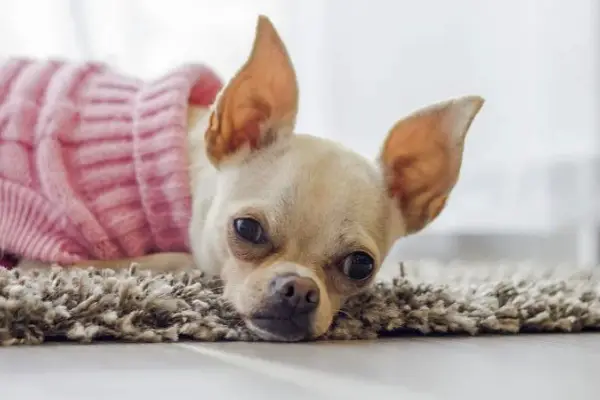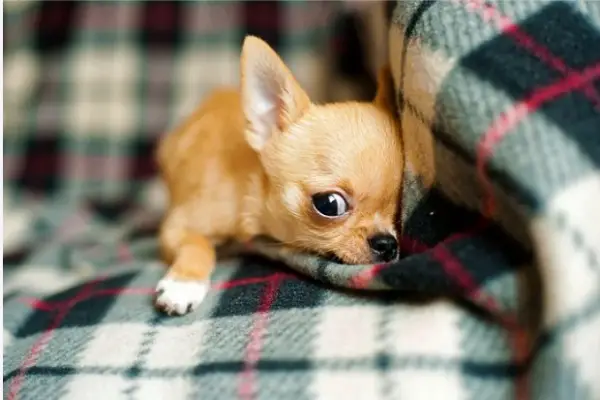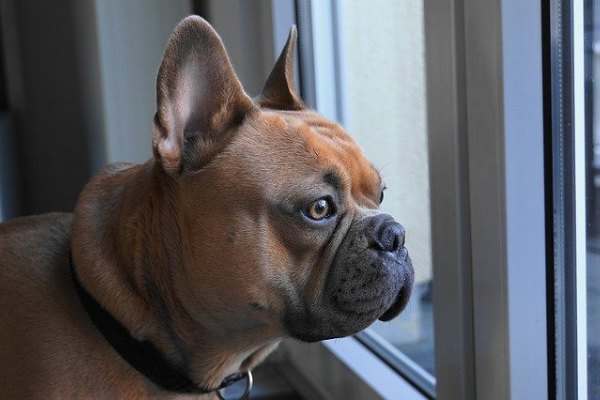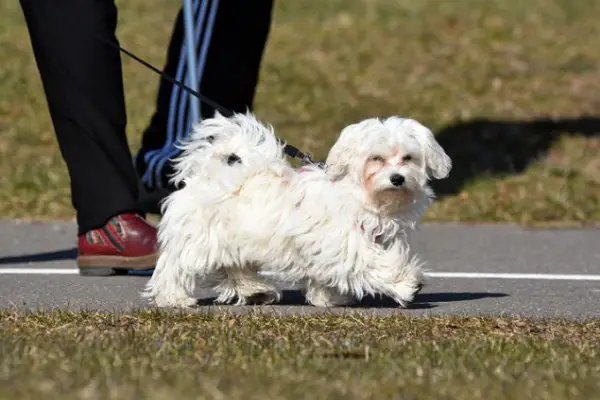Chihuahua Separation Anxiety: 11 Causes, Signs & Prevention

Over 85% of little dogs suffer separation anxiety because they get too attached to their owners, so let’s discuss Chihuahua separation anxiety issues.
We will be discussing all you need to know about Chihuahua separation anxiety, ranging from what it is, causes, signs you need to look out for, and finally, common ways to prevent Chihuahua separation anxiety.
If you leave your Chi alone for an extended amount of time unattended, the chances of separation anxiety kicking in is very high, that being said, let’s roll on!
Chihuahua Separation Anxiety
Chihuahua separation anxiety is a behavior problem that occurs when Chihuahuas are left alone unattended for a certain time period and this causes biting, excessive barking is left untreated can lead to Chihuahua becoming aggressive.
Biting, nipping, barking, self-isolation, destructive chewing, and other behaviors are all signs of separation anxiety in Chihuahuas.
If your Chihuahua already has separation anxiety, the two most common ways to relieve it are to go to the veterinarian and spend time with your Chihuahua.
You can also invest in anti-anxiety products or medication as prescribed by your veterinarian. Separation anxiety is one of the most common Chihuahua behavior problems.
Without wasting your time, now you understand Chihuahua separation anxiety, let’s outline some events that can cause separation anxiety in Chihuahuas.
What causes separation anxiety in Chihuahuas
The following are some of the most prevalent causes of separation anxiety in Chihuahuas you should know and avoid;
- Leaving Chihuahuas alone unattended for a lengthy period of time.
- Changes the meal schedule of Chihuahua on a regular basis.
- The death of a Chihuahua owner who was devoted to his pet.
- Boredom or despair persists over a lengthy period.
- It was a dreadful occurrence or a series of terrible encounters.
- On a regular basis, your surroundings change.
- Transfer of ownership.
- A relocation to a new city or location.
- A Chihuahua’s inability to hear or poor vision.
- Long time pilled up frustration.
- There is insufficient mental stimulation over time.
What are the signs of separation anxiety in Chihuahuas
All of the typical signs of Chihuahua separation anxiety that you should be aware of and on the watch for are listed below:
1. Frequent coprophagia when left unattended
Coprophagia occurs when your Chihuahua defecates in the house and then eats it, indicating that your Chihuahua is experiencing separation anxiety.
This is a regular occurrence when Chihuahuas are left alone and agitated, and most owners are unaware of the Coprophagia.
It’s not uncommon for your Chihuahua to use the bathroom while you’re gone, whether it’s with pee or excrement.
When your Chihuahua has separation anxiety, he or she may wreak havoc in your home.
2. Frequent house accidents when left unattended
If your Chihuahua has been completely housebroken but still has accidents when you leave the house and return to find them.
This is a clear indicator that your Chihuahua is worried about you while you’re gone, and if not handled, it will only become worse.
If your puppy or adult Chihuahua becomes frightened and starts eating his or her own excrement, keep a watch on him or her.
Regardless of matter how unpleasant this symptom is, you may take steps to avoid it or just fix the underlying illness that is causing your pup anxiety.
3. Frequently chewing of valuables when alone
When a Chihuahua is removed from its owner, he or she may scratch, chew, or damage its furnishings or toys.
Your Chihuahua may have chewed the table legs, doors, window sills, door frames, or even destroyed the couch or cushions when you return home.
The most prevalent causes of harmful chewing are depression, stress, and loneliness, all of which can be triggered by separation anxiety.
Chewing and digging in your home can cause your Chihuahua to become injured, such as breaking teeth, being cut, damaging its nails or paws, or even being injured by broken furniture.
4. Frequently barking when left unattended
Due to despair, frustration, stress, tension, and loneliness, Chihuahuas with separation anxiety may bark incessantly.
Separation anxiety in Chihuahuas develops over time, however as previously noted, it can express itself within minutes of the owner’s departure.
Your Chihuahua may bark excessively when you go to work or somewhere else because he is afraid of being alone.
As a result, you should be worried if your Chihuahua begins to bark significantly more than usual when you leave or enter.
5. Frequent freezing when left unattended
Because he is scared of being alone, your Chihuahua freezes or goes rigid when you arrive home from work or leave.
Freezing in your Chihuahua all the time may be bad for both you and your Chihuahua, as it can lead to biting and other behavioral problems.
If your Chihuahua continues to freeze as you walk away, it means he’s worried and won’t be able to manage the situation, which might end in a bite.
Chihuahuas with separation anxiety are known to freeze unnecessarily when their owners leave or return, which is a solid symptom of separation anxiety.
6. Frequently whining when left unattended
If your Chihuahua is angry, worried, or suffering from separation anxiety, he may whine at any moment.
If your Chihuahua can’t get away from the stressor, whimpering will almost always be followed by pacing.
When your Chihuahua isn’t barking because he has to go outdoors or is in pain, it’s most likely stress.
When Chihuahuas are stressed out due to separation anxiety, their natural whining may become uncontrollable.
It is, however, a warning that something is amiss in your Chihuahua’s environment. Anxiety may show up in a number of ways, one of which is complaining.
7. Frequent self-isolation
Self-isolation in Chihuahuas can be triggered by a variety of factors, with separation anxiety and fear being the most common.
When a Chihuahua is terrified, he may seek refuge in a little chamber or a piece of the owner’s clothes that has his scent.
Your Chihuahua may urinate inconveniently for hours while curled up beneath the table or elsewhere in the house.
If your Chihuahua begins to hide needlessly, don’t ignore it; instead, attempt to figure out why.
In a Chihuahua, this is one of the most obvious indicators of separation anxiety.
8. Following owner around
When your Chihuahua is scared of being apart from you, he will try all he can to escape the house and find you.
Your Chihuahua may damage himself by slamming his head and teeth on the cage bars in an attempt to persuade him to go because he is afraid of being alone.
If your Chihuahua attempts to flee the house every time you leave, don’t ignore it; it might progress to undesired behavior.
This is a major issue since it indicates that your Chihuahua is afraid of being alone, which can lead to separation anxiety.
9. Scratching of doors or walls when left unattended
Separation anxiety causes stress and anguish in Chihuahuas, leading to clawing at doors and walls.
You’ll notice your Chihuahua clawing at the exit door as you leave for work if he has separation anxiety.
You may also see your Chihuahua clawing at the walls, which is a clear indicator of distress caused by being alone.
If you come home to find scratches on your walls or doors, it’s a sign that your Chihuahua is irritated by separation anxiety.
10. Frequently digging when left alone
One of the most common causes of your Chihuahua digging up your yard, fence posts, bed, or basement is separation anxiety.
They dig to keep themselves engaged and away from boredom or loneliness when they are bored or have nothing else to do.
If you arrive home to find your Chihuahua digging in your yard, cellar, bed, or fence base, you must intervene and try to alleviate separation anxiety.
That’s a solid sign your Chihuahua is bored and ignoring it will only worsen the situation.
Now we have outlined signs of Chihuahua separation anxiety, let’s look at ways to avoid Chihuahua separation anxiety!!!
Ways to prevent separation anxiety in Chihuahuas
Separation anxiety in Chihuahuas may be prevented or reduced in a number of ways, some of which are given below:
1. Invest in anti-anxiety products
Talk with your veterinarian to provide you with the list of the most suitable anti-anxiety products and medications for your Chihuahua.
This method only applies if you notice your Chihuahua already developed separation anxiety.
2. Set up a window view of the outside world
If you live in a busy neighborhood, make sure your Chihuahua has a good view of the outside world by providing a clear window view.
Your Chihuahua can watch passers-by as well as birds from the window.
You must socialize your Chihuahua to prevent him from barking at other dogs from the window.
Ascertain that your Chihuahua can easily climb up and down the clear glass-covered window.
3. Leave your radio or TV on
Another common way to help Chihuahuas with separation anxiety is to train them to associate calmness with watching TV or dog shows.
To help your Chihuahua relax and watch while you’re gone, show them a range of dog shows.
Get as many dog movies as you can and let your dog choose the ones that will keep them engaged and quiet.
While you’re doing anything else, teach your Chihuahua to sit and watch some dog shows on TV.
As a consequence, while you’re away, your Chihuahua will love watching animated dog programs and will remain calm.
4. Start crate training sessions
Crate training is a popular puppy training technique for a variety of issues, including separation anxiety.
Crate training may provide a safe and tranquil environment for your Chihuahua when you’re gone for an extended period of time.
The goal is for the dog to link fun stuff like chew toys and food-releasing puzzle games with his kennel, making him want to spend time there.
When dogs are left alone, they may feel safer and more at ease, so keep an eye on your puppy’s behavior to see whether his anxiety symptoms improve or worsen.
5. Buy a pet camera and dispenser
This is a great way to keep your Chihuahua engaged while you’re away; dogs love treats and food, so you can use those to keep them entertained.
You’ll have to be careful; the dispenser may be programmed to disperse your Chihuahua treats over time.
Another option is to purchase one of the remote cameras offered on Amazon.
While you’re at work, you’ll be able to see and chat with your dog. This may provide you with great relief.
These dog cameras have high Amazon reviews and might be a smart choice if you plan to leave your dog home alone for an extended amount of time.
Chewy has a suggested treat dispenser, and this one is also available on Amazon.
6. Create and stick to a daily schedule
Make time for your Chihuahua to play, play games, and eat with you. There should be enough time for each and every task during the day.
Because your Chihuahua will always know what to expect, he will be more relaxed. Keep them active and interested at all times.
Your Chihuahua will never be bored or notice your absence since he will be occupied for most of the day.
Make a daily regimen for you and your Chihuahua that works for both of you, and delegate as much as you can.
If it’s time to feed your Chihuahua, don’t put it off; instead, practice until your Chihuahua is at ease.
The majority of your issues will be resolved if you and your Chihuahua devise a schedule that works for both of you.
7. Talk to a family member or pet sitter
If you have relatives or friends nearby, you can enlist their assistance in sitting your Chihuahua until you return from your trip.
Chihuahuas are a friendly breed that can get along with people if properly socialized.
After crate training and other approaches, this should be your final resort.
If you’ll be gone for the bulk of the day, consider hiring a pet sitter for your Chihuahua.
Depending on your state, agreements, and who would watch your Chihuahua, a pet sitter for your Chihuahua will pay between $20 and $35.
As a consequence, your Chihuahua will be visited on a regular basis by the pet sitter while you are away till you return. With this info, you should now understand Chihuahua separation anxiety!

![How Long Should Dog Nails Be [Detailed Answer] How Long Should Dog Nails Be](https://petcreeks.com/wp-content/uploads/2023/09/dog-4369608_640.jpg)


![Do Beagles Shed [9 Reasons They Shed] Do Beagles Shed](https://petcreeks.com/wp-content/uploads/2023/04/Do-Beagles-Shed-768x555.jpg)

![Do French Bulldogs Shed A Lot [9 Shedding Causes] Do French Bulldogs Shed A Lot](https://petcreeks.com/wp-content/uploads/2021/07/Do-French-Bulldogs-Shed-A-Lot-768x644.jpg)